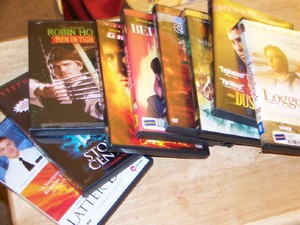
Image by mdverde via Flickr
Fred Clark over at Slacktivist recently made another post in his series about what motivates some people to disseminate false, injurious information about others despite that information being demonstrably false. In this particular post, Fred uses the videos over at Good Fight Theater as an example for the continuing discussion. While I highly recommend Fred’s post and the ongoing series of which it is a part, I wanted to look at a related but slightly different topic: The way that groups like Good Fight Ministries tend to stretch and twist whatever they’re looking at to make it fit Christian theology and/or cosmology.
For this post, I’m going to focus on GFM’s video regarding the first Transformers movie. I’ve watched clips from a few other GFM videos, and I get the impression that my criticisms can be adequately applied to most of their videos. But as the Transformers video is the only one I’ve watched in full, I’ll focus on that one.
The goal of the GFM video is to suggest and argue that Transfomers — and other movies about aliens (and an interest in aliens in general) — is an attempt to brainwash humans into accepting the lead of demons during the final battle of Armageddon as portrayed in Pre-Millenial Dispensationalism. (As an aside, Fred also offers a wonderful look at PMD theology as part of his ongoing review of the Left Behind series.) GFM does this by suggesting that in Transformers, Michael Bay is effectively portraying the fallen angels of Armageddon with as the good guys — in the form of the Autobots — and God and the angels of Heaven as the bad guys — in the form of the Decepticons. However, it seems to me that GFM has to make a lot of assumptions — assumptions I’m inclined to question, challenge, and even refute — in order to make that argument.
The first assumption is that the Cube — the original source of creation life on the Autobots’ home planet — is somehow representative of the Christian god. It’s not clear to me why GFM makes this claim. While it is certainly understandable that the Cube possesses capabilities that is often considered the sole domain of the Christian god, I find that a tenuous argument for this comparison. After all, nothing suggests that the Cube is the creator of the entire universe or even all life in it. If the Cube is not the sole source of life — and much in the movie left me with the impression that its not — then the comparison between the Cube and the Christian God quickly falls flat.
Another consideration is the nature of the Cube. Specifically, the Cube is not portrayed as a conscious being with personality or identity. Again, this separates it from the god of Christianity, which is very much a conscious being with personality and identity. This alone suggests that a better parallel to a divine force found in other religions that have a more impersonal conceptualization of God.(1)
This impersonal nature of the Cube creates another problem for the assumptions in GFM video. The GFM video suggests that Transformers is based on the Gnostic idea that God is evil. However, how can an impersonal god like the Cube be evil? The Cube has no plans and gives no orders. All of the actions of the Decepticons — those GFM ministries would like us to believe are the stand-ins for Jesus and the heavenly host in the movie — come from Megatron, not the Cube.
Theologically, this causes problems for GFM’s claims. If we accept that Megatron is the stand-in for Jesus in this movie(2), then that would mean that Megatron is acting on the authority of God’s stand-in, the Cube. However, it is clear that Megatron’s authority and power is not granted by the will of Cube, but is gained by him by his control of the Cube. Such a discrepancy further destroys the analogy that GFM is attempting to make.
This also comes into play when we consider Optimus Prime’s plan to destroy the Cube. GFM points to this as paralleling the fallen angels of his own theology who wish to destroy the Christian god. The problem with this comparison is that the fallen angels of GFM’s wish to destroy God in order to take his place and rule over the universe. In contrast, Optimus Prime merely seeks to destroy the Cube as a last resort in order to prevent Megatron from using its power to destroy and control others. In this sense, it’s not only the actions that are being inverted in Michael Bay’s supposed “retelling” of the Final Battle, but the players’ motives as well.
This is particularly notable when you consider Optimus Prime’s plans for destroying the Cube if it becomes necessary. The leader of the Autobots plans to destroy the Cube in a way that will require him to sacrifice his own life. Indeed, the decision to ultimately destroy Megatron along with the Cube is actually Shia LeBeouf’s doing. Optimus’s plans for self-sacrifice strike me as far more, well, Messianic.
In order to accept GFM’s interpreation of the movie, one must completely ignore the actions, goals, and motives of the characters being portrayed. One must completely ignore where the analogy quickly falls apart. And one must be willing to accept the wanton disregard for life and the desire to control and destroy others is an acceptable depiction of God’s just wrath. (3)
In other words, to accept GFM’s interpretation of this movie as an inversion of the Final Battle of PMD theology, one has to put the entire movie through a blender and force it into preconceived notions. It makes far more sense to me to watch the movie and consider the ideas it offers on their own merits.
Notes:
(1) Of course, it’s possible that the folks at GFM consider all non-Christian religions to be nothing more than inversions and perversions of Christianity. So this distinction may not matter to them. However, I personally think it’s an important one. After all, not everyone sees everything in terms of being a direct perversion of or attack on Christianity.
(2) Bear in mind that the biggest argument for this supposition appears to be that
Megatron sounds a lot like Metatron, which is a name mentioned in
certain extra-Biblical texts and might be another name for Jesus
according to extra-Biblical commentaries on those extra-Biblical texts. So not only is GFM playing fast and furious with the movie to make it fit their theology, but their having to invoke appeals to theology that many of their fellow Christians might find questionable.
(3) And there I think is the greatest problem with GFM’s interpretation of this movie. In order to accept this, one must not only believe in a god that is a wanton tyrant who treats his Creation with contempt and disregard for its ultimate well-being, but you must believe that such a god is worthy of respect and adoration. Perhaps teh folks at GFM can do so, but my own conscience forbids it.


